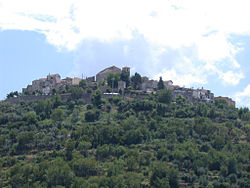Campodimele
| Campodimele | ||
|---|---|---|
| Comune | ||
| Comune di Campodimele | ||
 |
||
|
||
| Location of Campodimele in Italy | ||
| Coordinates: 41°23′N 13°32′E / 41.383°N 13.533°E | ||
| Country | Italy | |
| Region | Lazio | |
| Province / Metropolitan city | Latina (LT) | |
| Government | ||
| • Mayor | Roberto Zannella | |
| Area | ||
| • Total | 38 km2 (15 sq mi) | |
| Elevation | 647 m (2,123 ft) | |
| Population (1 June 2009) | ||
| • Total | 671 | |
| • Density | 18/km2 (46/sq mi) | |
| Demonym(s) | Campomelani | |
| Time zone | CET (UTC+1) | |
| • Summer (DST) | CEST (UTC+2) | |
| Postal code | 04020 | |
| Dialing code | 0771 | |
| Patron saint | St Onuphrius | |
| Saint day | 12 June | |
Campodimele is a town and comune in the province of Latina, in the Lazio region of central Italy. It is located on a steep Karstic hill, between the Monti Ausoni and Monti Aurunci ranges.
The economy is mostly based on agriculture.
Campus Mellis rose probably over the ruins of Apiola, a very ancient Latin city, destroyed by Tarquinius Priscus, fifth king of Rome (579 BC); the ruins of Apiola are visible 6 kilometres (4 mi) away from the present-day historic center of Campodimele. In the 6th century AD the Lombards established the first fortified settlement, while in the following century it was part of the possessions of the Monastery of Montecassino.
From 916 it was acquired by the Duchy of Gaeta. Campo de Melle is mentioned again in a donation by the Consul of Fondi in 1072. In 1087, Pope Victor III has a list of the abbey's property sculpted onto the bronze door of the Basilica of Montecassino. In 1384 it became a possession of the Caetani family of Fondi, but, in 1497, King Frederick IV of Naples gave the county of Fondi with the surrounding duchies, including Campodimele, to the Colonna family.
In 1534 Giulia Gonzaga fled here from the Algerian pirate Hayreddin Barbarossa. In 1591 the fief was inherited by Luigi Carafa, Prince of Stigliano. Campodimele gained municipal rights in 1813.
During World War II the Gustav Line passed through Campodimele. Alberto Moravia, who had been deported here, took inspiration from the happenings of the time for his novel La Ciociara.
...
Wikipedia


